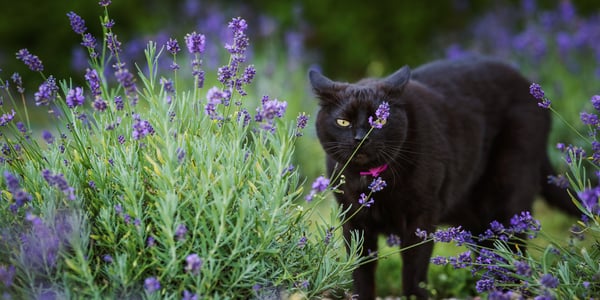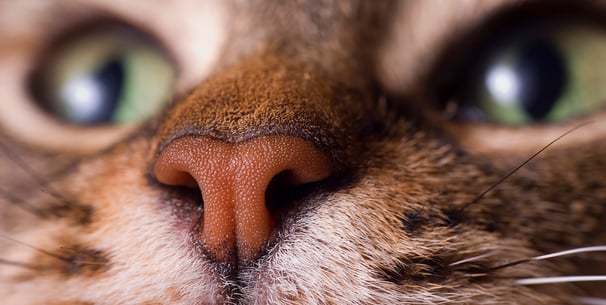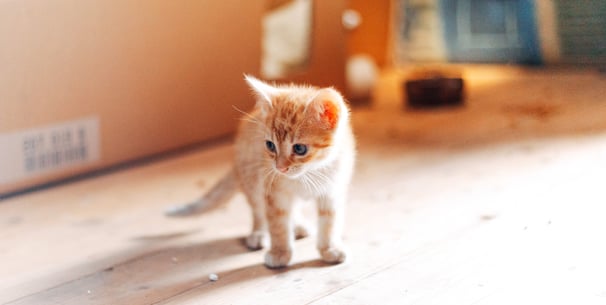You may not always feel like you're in sync with your pet, and that's fine. We've collected all the information we think might help you to reach peak pet parent. Subscribe to get the freshest posts, straight to your inbox.
10 Smells That Cats Hate: Our List of Scents That Cats Avoid
Index:



Introduction
Some scents and certain things that a cat smells can trigger a strange reaction. But which ones?
We know that cats are creatures of habit, and when they constantly turn their nose up at particular things they dislike, it can feel frustrating, almost as if your entire home needs a deep search to find the offending scents.
Stick with us, and we’ll show you the top 10 smells that cats hate, plus how to use them safely as a deterrent.
Key takeaways
Cats generally have a sensitive sense of smell that strongly influences their behaviour.
Many smells cats hate can be found in natural essential oil blends, and watch for oils that are toxic to cats.
You can deter cats from going into certain areas by using smells to deter them, such as citrus or banana peel.
A dirty litter box often invites more problems than solutions, so keep your cat’s space clean.
Some cats dislike particular odours, like lavender or tea tree, more than others.
Using scents carefully, alongside good cleaning routines, helps keep cats away humanely.



Why cats hate certain smells
Cats and dogs alike depend on their olfactory abilities, but the powerful sense of smell in felines is especially important.
Cats find the world through their noses, which means something unpleasant to cats can send them running.
If deterring cats, some people use their sense of smell strategically, keeping them out of specific areas.
Whether you’re trying to protect your garden, your sofa, or even your favourite pot of basil, tapping into cats’ natural likes and dislikes can be incredibly effective if used humanely.
You might notice that even though cats have unique preferences, there are some universal smells that cats hate.
From citrus fruits to strong herbs like rosemary and thyme, certain plants and oils are natural deterrents.
However, always keep a cat’s safety in mind as many essential oils can be toxic to cats if they are ingested or applied directly on their fur.
10 scents that cats hate and how to use them safely
Below is a handy table summarising these aromas, why cats dislike them, and how safe they are if your cat may sniff around or could actually try to ingest them before being repulsed:
Let’s dive a bit deeper into how each scent can help you deter cats safely.



1. Citrus
Citrus fruits like lemon and orange release an aroma that cats find overpowering. You can place citrus peels near windows or garden beds as a natural repellent.
Just be mindful if you spray citrus-based cleaners as some contain essential oils that might be toxic to cats if your furry friend licks the surface.
2. Eucalyptus
Eucalyptus is avoided because of its strong, fresh qualities with a potent, cool fragrance.
Cats dislike it and often steer clear. However, it can be risky; concentrated eucalyptus essential oil can cause poisoning in cats if they ingest it.
Use it as a mild, diluted spray in areas you may want to be cat-proof, but never apply it to or get anywhere near a cat’s fur.
3. Peppermint
Cut through mild odours with a Smell of peppermint. This herb’s bracing smell and subtle menthol effect can prompt cats to run in the opposite direction.
Always keep peppermint-based solutions or diffuser oils high enough so your cat can’t reach them, because ingestion can be dangerous.
4. Lavender
Even though humans often love the smell of lavender for its calming vibes, many cats hate the smell because it’s too strong for their sensitive sense of smell.
Use dried lavender sachets in closets or near furniture. A light, water-based lavender spray can also help deter cats from going where they shouldn’t, but remember to avoid saturating surfaces your cat might lick.
5. Rosemary & thyme
If you grow an indoor herb garden, you may already know that cats rarely chew on rosemary and thyme.
They find these pungent herbs overwhelming. Planted near doorways, these herbs can naturally keep cats away from certain rooms or off your windowsill.



6. Banana
The smell of banana, and especially the banana peel, is another classic cat-deterrent. You can place a peel near plants, or wherever you wish to block kitty traffic.
Some cats can’t stand this at all and quickly avoid the area. This is because the peel contains a chemical called ethyl acetate.
However, some cats actually will eat a little banana although it is not generally recommended. so if you’re curious about other ways bananas interact with feline health, check out our guide on Can Cats Eat Bananas?.
7. Mustard
When we mention mustard, it’s usually about sandwiches or a hot dog. But for your cat, these might be one of the worst odours in the kitchen.
A dab of mustard in a small saucer situated near a door can work as a harmless barricade if you want to keep a cat from a certain area. Just ensure your cat doesn’t try to lick it, as the spiciness can cause discomfort or lead to tummy upset.
8. Tea tree
Tea tree oil is widely marketed as a natural antiseptic for humans, but cats don’t respond well.
They might turn their nose away and even show signs of poisoning if they ingest it or if it’s too concentrated.
If you suspect any poisoning in cats, reach out to a veterinary professional right away.
9. Vinegar
Good old vinegar is strong enough to deter cats from going anywhere near it. Its acidic odour is unpleasant to cats, so they usually steer clear. Plus, it’s a great household cleaner in many cases, just be ready for the tangy whiff.
10. Skunk or chemical odours
While none of us want a real skunk around (not really a problem in the UK!), the stench of skunk spray or even harsh household chemicals can be extremely off-putting for felines.
We don’t suggest actually welcoming these smells into your home for obvious reasons. But do remember cats will typically avoid any strong chemical scents, just be cautious because some chemicals can be harmful to both cats and dogs if inhaled or licked.



Practical pointers for cat-proofing
Keep your litter tray spotless. Dirty litter or a dirty litter box is one of the main reasons cats seek out alternative spots. Explore our best cat litter guide for suggestions.
Opt for natural materials first. If you plan to use smells from essential oils or chemically produced repellents, double-check they’re non-toxic to cats.
Always watch for signs of poisoning in cats. If your cat acts sluggish, vomits, or avoids food after encountering anything they find repellent, consult a veterinarian.
While different cat breeds, from the 10 rare cat breeds to the beloved moggy cat, may have varied likes and dislikes, these surprising smells cats hate are fairly universal.
Some cats react more strongly than others, so be patient and observe your kitty’s responses in a loving way.
Conclusion
If you want to learn everything you need to know about the scents cats hate, our content has hopefully set you on the right path.
From banana and mustard, to many essential oils, there are certain scents that can keep your cat away from a specific area.
When they dislike the smell, they will avoid the area at all costs.
It is also important to understand what you should and shouldn't keep around your cat as certain things could be potentially toxic.
By understanding each cat’s powerful sense of smell, you can provide the best environment for them, and for you.
Here’s wishing you and your furry friend a freshly scented, harmonious home!
If you’re concerned about health costs or want peace of mind that your cat’s well-being is safeguarded, consider Waggel Pet Insurance.
We offer modern, straightforward cover that helps you focus on what matters most: enjoying your feline friend.
Want to read more about feline curiosities?
Pop over to our article on Why Your Cat Stares At You to learn more about the subtle ways they communicate.
Waggel Pet Insurance
Need more help? You're in luck if you're a Waggel Pet Insurance member. Along with our excellent coverage, we offer access to a 24/7 online vet to answer all your sticky questions, especially if you need grooming assistance.
Not a member? Why not get a quote now and cover your furry friend for a range of illnesses, all while enjoying our amazing perks and rewards.
Want more like this?
Get updates from us with helpful info, advice, answers to frequently asked questions and much more.
Index:
Related posts:
Get your quote
Along with our excellent coverage, we offer access to a 24/7 online vet to answer all your sticky questions.





